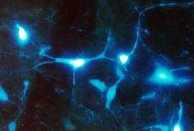
There have long been debates about whether our minds are the products of brain activity, whether our brain activity is our mind, or whether something else (natural or supernatural) is responsible for our consciousness and sensations.
Those who have suffered brain damage have experienced changes and losses in some aspects of their consciousness
[1]. Some have shown drastic changes in personality. Memories, thoughts, opinions, and consciousness have all been seen to change, and change in direct relationship to the area of the brain one would expect given the behavior
[2]. Even external stimulation of regions of the brain result in experiences of thoughts, memories, emotions, and feelings
[3]. In every case, it seems to be exactly what one would expect if the mind, our thoughts, and our consciousness, were fully a result of the physical activity in the brain.
What we experience subjectively may simply be "
what it feels like" to be a biochemical information processor. When we experience thoughts of a tree for example, that's what it feels like to be an informational system whose neurons which code for trees are active.
Is this necessarily true? It seems to me to be a very likely straightforward possibility, without assuming additional phenomena which are yet to be proved. While it's possible there may be all sorts of other invisible/magical/paranormal/other-dimensional/unknown/whatever phenomena going on, it seems to me the only reason to particularly believe this is out of an emotional urge to
want to believe otherwise.
This urge is related to the fact that when a lot of people think about the possibility of being a fully material biochemical information processor, they think of it as degrading, or meaningless, or bland, or even horrific.
But this is merely a socially learned response. A response learned from a society which, somewhere along the line, tragically split its conception of reality into the material and a non-material realm. Like a suicidal village dumping all of its food for the winter into the river, we proceeded to conceptually deposit everything and anything meaningful, beautiful, or dignified into this unseen and unknowable realm.
The result, centuries later, is a society which engenders in its people, from the time of youth, a base-level, almost primal, feeling that anything material is ultimately worthless - and this notion lingers, even in the back of the minds of those who have consciously rejected the supernatural. In its place these folks sometimes create paranormal and "as yet unknown" natural realms - basically modern day stand-ins for the supernatural which are perceived to be more intellectually respectable than talking about magic.
But some see nothing undignified or meaningless or horrible in our material universe. In fact, they find it quite wondrous, beautiful, and awe-inspiring. The fact that we can experience the consciousness and qualia we do in such a universe is all the more cause for awe. For these folks, there seems to be no reason for a negative reaction to the idea of exclusive naturalism. And were it not for such a reaction, the above understanding of the mind as physical/informational function would be the obvious conclusion of nearly anyone (until or unless some provable indicators to the contrary popped up in research).
It's also puzzling to me just what
would avoid a similar negative reaction. Imagine if we were to ever discover for certain a non-physical phenomenon that transcended or operated in addition to physical brain function. Later, we might begin to discover specifics about how it operated, of what it was composed, and so on. Before long school children would be nodding off to 'boring' lectures on the ‘laws of the non-physical’.
It seems to me in this case, the same people who weren't satisfied with material explanations would also not be satisfied with this, and begin to find these datum to be similarly horrible and meaningless.
Refusing to settle for anything but the mysterious, they would then have to imagine and postulate *further* explanations beyond what had been discovered. You can bet that all of these extra notions would be logically self consistent, fully possible, and would be impossible to ever disprove (such scenarios are easy to construct).
All of this, because of a peculiar connection in their minds between the unknown or mysterious and the beautiful or meaningful - a somewhat egotistical necessity, being "only that which is unknowable is suitable to explain myself".
I can't comprehend or relate to such a necessity, for either intellectual or even aesthetic reasons.
[1] Morten L. Kringelbach, "Emotion, Learning and Reading"
[2] The Franklin Institute Online, "The Human Brain"
[3] Spirituality and the Brain, "The Sensed Presence and Vectorial Hemisphericity"
 A few weeks ago I gave a talk at the Houston Church of Freethought. The subject was on "Freethought and Compassion". Finally, I have gotten around to editing the presentation into a presentable essay in print, formatting it, and noting references. If anyone would like to read it, it can be found on my philosophy site, or by clicking HERE.
A few weeks ago I gave a talk at the Houston Church of Freethought. The subject was on "Freethought and Compassion". Finally, I have gotten around to editing the presentation into a presentable essay in print, formatting it, and noting references. If anyone would like to read it, it can be found on my philosophy site, or by clicking HERE.





